The EU budget plan for 2024 does not mention such an increase. Salary increases for EU staff and the Commission president are automatically calculated according to strict rules that depend on the inflation level in Brussels and Luxembourg and the change in purchasing power of civil servants in the member states.
“Incredible: Ursula demands a pay raise of 15 percent! 4,700 euros a month more! Following a salary increase of 8 percent already in January. Ditto for EU officials. Meanwhile, inflation and austerity for the people,” far-right French politician Florian Philippot said in a Facebook post which was shared nearly 800 times.
“Ursula von der Leyen, who has plunged the working class into the doldrums, is demanding a salary increase of 15%! Total indecency,” said one internet user in a tweet with nearly 600 likes. These claims have also been circulating on German and Dutch social media.
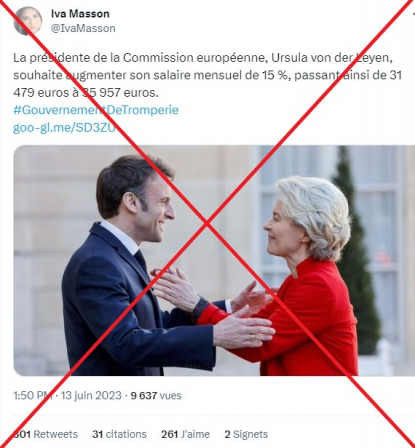
Most of the posts share an article published on June 12, 2023 by the Austrian online news portal eXXpress. “What can be read in the budget plan of the European Union for 2024, which has just been exposed, will make many Austrians and Germans really angry: while workers in these countries… have to bear the enormous burden on their families of the still brutal inflation, the 50,000 EU employees want to treat themselves to a 15-percent increase on their monthly renumeration,” the article said.
Regarding the president of the European Commission, eXXpress added: “following the recent seven percent salary increase, von der Leyen now collects 31,250 euros gross per month. Starting this coming year, this will become 35,957.50 euros — so she will receive 4,687.50 euros more per month!”
“These articles are false and misleading,” the European Commission’s representation in Austria said in a statement published on June 15.
While the EU budget plan for 2024 does include figures for salary increases for EU officials and members of the Commission, the 15-percent figure does not appear anywhere in the document.
What’s more, these increases do not stem from demands made by von der Leyen, but are automatic updates whose calculation method is precisely defined by EU rules.
EU draft budget for 2024
The European Commission on June 7 proposed an EU budget of 189.3 billion euros for 2024. The budget still must be negotiated and approved by the member states and the European Parliament in the months to come.
The draft budget is available on the European Union’s website. It details the estimated budget of every European institution for 2024, and notably that of the European Commission.
“High inflation and rising energy prices continue to create substantial pressure on administrative expenditure. The Commission has again carefully assessed the budget request for its own administrative appropriations for 2024 and sought to offset any necessary increases by reprioritisation and reductions in all possible areas,” the draft budget said.
Regarding the Commission’s expenditure for staff renumeration, the budget mentions a 4.7-percent increase that mainly results from “the estimated annual salary update as of 1 July 2023 (+4.4%) and as of 1 July 2024 (+3.4% on a six-month basis)”.
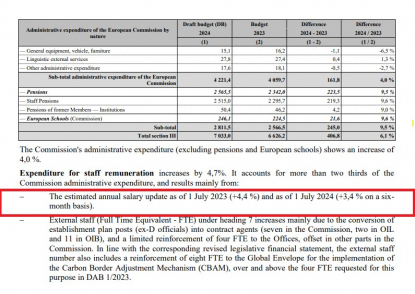
The draft budget is accompanied by a series of annexes or “working documents”. The sixth one addresses administrative expenditures of EU institutions. It includes estimated salary increases for members of the European Commission, including its president, von der Leyen.
The document specifies the calculation method for the salaries of Commission members. For the president, her salary is equivalent to 138 percent of the basic salary of a grade AD 16/3 civil servant on 01/07/2022 — which was 22,646.29 euros — or 31,252 euros. This figure corresponds to what the eXXpress article said was von der Leyen’s current gross salary.
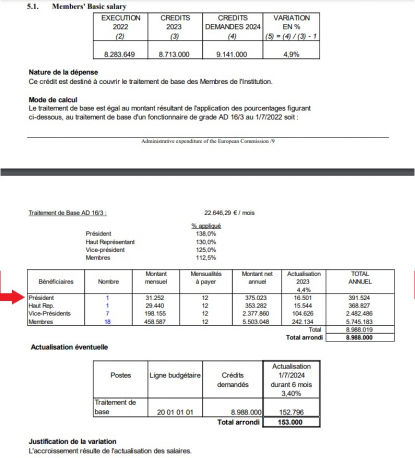
A table summarises the increase provisioned for the coming year. As is the case for other Commission employees, the anticipated salary increase for von der Leyen is 4.4 percent. The table also mentions a potential update of 3.4 percent on July 1, 2024 for von der Leyen, as well as for other Commission employees.
Nowhere does the document mention a 15-percent salary increase, be it for von der Leyen or for any other employee of the European Union.
What’s more, the increases mentioned in the draft budget have not been adopted.
They are but estimates. These figures aim “to anticipate possible budgetary needs. This does not mean that this amount will be paid to EU staff. What will be paid, will be the amount that will be calculated by Eurostat (the EU’s statistical agency) based on the evolution of national civil servants purchasing power,”, the Commission’s press office told AFP on June 19.
Automatic increases
The salary of the European Commission president is not set according to the wishes of the person in the position but abides by rules established in 1967. As mentioned in the draft budget, that amount corresponds to 138 percent of the salary of a civil servant who has reached the highest level and grade on the grid.
As for its annual change, that too abides by rules. They apply to EU officials, MEPs and judges of The Court of Justice of the European Union (CJEU).
“The salary update is based on a 2013 decision by the European Parliament and member states in the Council, which decided on a pre-set system of calculating salary adjustments for EU institutions,” a spokesperson for the European Commission told AFP.
The evolution of wages of EU officials depends on two factors: the change in inflation and the change in purchasing power — whether upwards or downwards — of civil servants in the member states.
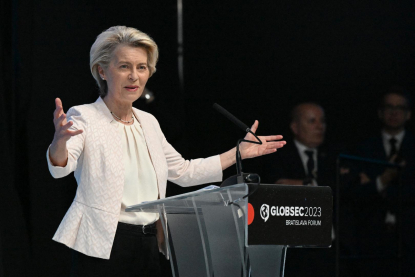
“The exact figure of the update is calculated by Eurostat based on the evolution of national civil servants’ net purchasing power over the period of July of the previous year to July of the current year as well as the evolution of inflation in Brussels and Luxembourg… In other words, if salaries of public officials in our member states increase or decrease on average, so do those of EU officials. If during the first half of the reference period high inflation is oberved, an intermediate update is foreseen,” the spokesperson explained.
In concrete terms, the salaries and pensions of EU staff (including those of the Commission president) are automatically updated once a year (on the December pay slip). Exceptionally, when inflation is very high (above three percent during the first half of the reference period), there is an automatic intermediate update in the middle of the year (normally along with the June pay slip).
“That is the case this year. The intermediate update is 1.7 percent and was paid to staff with the June payslip, retroactively since January 2023. In December 2023, there will be a final automatic annual update, reflecting the final evolution of purchasing power of national civil servants. This annual automatic update takes into account what was paid in the June intermediate update,”, the European Commission’s press office said.
“Because the final evolution (of purchasing power) of national civil servants between July 2022 and July 2023 is not known yet, it is not possible to know what the automatic 2023 annual update will be… This is also true for the 2024 annual update,”, it added.
That is also what the Union Syndicale Federale (USF) — which represents European public service employees — explains on its website. Between July and December 2022, inflation in Brussels and Luxembourg increased by 3.7 percent according to Eurostat figures. But at the same time, the purchasing power of national civil servants fell, resulting in an intermediate update for EU officials of 1.7 percent.
“As inflation slows down, it is too early to try to predict the likely level of the annual update, but it is important to note that the 1.7 percent update that we will already have received mid-year will of course be deducted from the method’s annual result,” the union said.
For the salary of EU officials and von der Leyen to grow by 15 percent at a time when inflation is slowing in Belgium and Luxembourg (to a respective 2.7 percent and 2 percent in May according to Eurostat), that would require the purchasing power of civil servants in member states to improve very considerably.
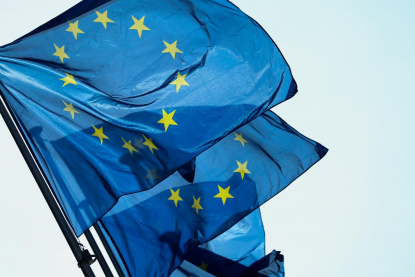
( AFP / KENZO TRIBOUILLARD)
A 4.5-percent increase in 2022 plus an adjustment
Many of the social media posts that we looked at claim that EU officials and von der Leyen already received a salary increase of seven percent in 2022. The figure is correct, but the increase is in fact a result of an exceptional adjustment.
From July 2021 to June 2022, inflation in Brussels and Luxembourg rose by 8.6 percent. But during that same period, the purchasing power of national civil servants decreased by 3.9 percent. The net increase of EU staff renumeration was thus 4.5 percent for the year, after taking into account an intermediate increase of 2.4 percent as a result of high inflation, the USF explained.
Added to that increase was a “2.5-percent salary increase that was not applied in 2020 due to the economic crisis”, according to the USF. This gives a total seven-percent increase.
“The 2.5-percent increase was granted to national civil servants back in 2020, but was suspended for EU staff becaue of the significant decrease of the EU GDP in 2020,” the Commission’s press office told AFP. In 2022, this increase was unblocked because the EU GDP had reached its pre-crisis level from 2019.
This freezing mechanism was also explained in 2021 by the Union for Unity, another union representing EU staff. It said on its website that the 2.5-percent increase had not be awarded because of the exception clause, since the EU’s GDP had decreased by more than three percent. It then added that the amount would be applied once the EU’s GDP returned to its 2019 level.
The salaries and benefits of EU staff and institution leaders are a constant subject of criticism, notably from certain member states in times of budgetary restraints (for example here, here or more recently here). They are also regular targets of misinformation, some of which AFP has previously fact-checked.
Bénédicte REY
AFP Belgique
Translated by Anna Maria JAKUBEK
Vous avez un doute sur l’authenticité d’une info, d’une citation ou d’une image ?
Contactez-nous sur WhatsApp ! WhatsApp

- Accueil
- A propos
- Comment nous travaillons
- Règles éditoriales et éthiques
- Notre équipe
- Manuel du fact-checking
- Formations
- Objectif Desinfox
- Contact
- Corrections
- Abonnement pour les pros
Copyright © AFP 2017-2023. Tous droits réservés. Les visiteurs peuvent accéder à ce site, le consulter et utiliser les fonctionnalités de partage proposées pour un usage personnel. Sous cette seule réserve, toute reproduction, communication au public, distribution de tout ou partie du contenu de ce site, par quelque moyen et à quelque fin que ce soit, sans licence spécifique signée avec l’AFP, est interdite. Les éléments analysés dans le cadre de chaque factuel sont présentés ou font l’objet de liens dans la mesure nécessaire à la bonne compréhension de la vérification de l’information concernée. L’AFP ne détient pas de licence les concernant et décline toute responsabilité à leur égard. AFP et son logo sont des marques déposées
